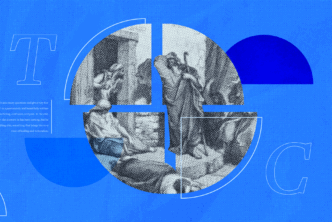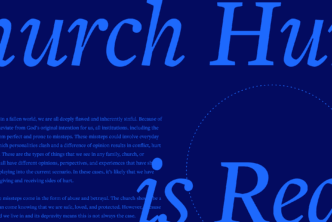The world with its flashing screens, its promises of pleasure, its offerings of wealth, its promotion of power and fame, screams for our attention. It is like Lady Folly in Proverbs, luring us to fix our gaze on things below. Much of what we see in this world is beautiful—and that shouldn’t surprise Christians, for God is the one who “made heaven and earth, the sea, and all that is in them” (Ps 146:6). Yet we are not called to set our minds on this earth—quite the opposite. The apostle Paul charges Christians, “Set your minds on things that are above, not on things that are on earth” (Col 3:2).
What does it mean to set our minds on things above? Far from a simple thought, this scriptural idea is rich and multifaceted. Here I want to explore what Paul means by his command, and then I wish to consider how his inspired words can have their intended effect in our day-to-day lives.
What it means to “set your mind on things above”
What does it mean to set our minds on things above? We might note at least five characteristics.
1. Centered on Christ
It is centered on the human–divine Christ. Alistair Wilson observes that the word translated “things” in Colossians 3:1–4 doesn’t tell us specifically what those things are, but “the context makes it clear that the primary focus of attention is to be Christ.”1 This is true in the immediate context, which identifies “things above” as “where Christ is, seated at the right hand of God” (3:1). And it is true in the broader context of the book, for the word “then” in Colossians 3:1 pushes us back to what Paul has discussed in the first two chapters of the book, where he lays out a rich Christology.
Jesus is described as God’s “beloved Son” who has secured “redemption” and “the forgiveness of sins” (Col 1:13–14). Christ is the one who has made “peace” and “reconcile[d] to himself all things” (1:20). He is “the image of the invisible God” (1:15), and “in him the whole fullness of deity dwells bodily” (2:9). This fully divine Son of God became fully human, bringing God to us in a way we in our finite, sinful state could receive him. He is the one “by [whom] all things were created” (1:16), and he has authority over both the church and all creation (1:16–18). This great Christ has triumphed over all opposing powers (2:15) and given us new life (2:11–14).
According to John Owen, when we love the things of this world too much, “our view of the glory of Christ” becomes “weak, imperfect and unsteady.”2
Setting our minds on things above is rooted in meditating on the glorious vision of the human–divine Christ.
2. Extends to all of Christ’s way and kingdom
The “things above” concept incorporates all that characterizes Christ’s way and kingdom. As Philipp Melanchthon understands it,
Those things which are above signifies heavenly or spiritual goods, such as faith, peace, a patient heart, love, chastity, and such things. Those things which are beneath means carnal goods, such as pleasures, riches, the glory of the world.3
“Things above” is an encompassing idea, not a narrow vision. It includes Jesus and all the beautiful realities that he taught and lived and now calls us to. A life oriented to the things of God and animated by the Spirit of God will place this world—a world that can give nothing but death—in its proper perspective; it will focus our gaze on that which lasts (Rom 8:5–6).
3. Tethered to Christ’s reign
This mindset is tethered to the reign of Christ. So the Nicene Creed reminds us:
I believe in one Lord Jesus Christ, … who ascended into heaven, and sits on the right hand of the Father; and he shall come again, with glory, to judge the living and the dead; whose kingdom shall have no end.
The reign of Christ is central to the Christian faith; if Christ hasn’t risen to reign, then he isn’t the king we proclaim him to be. But if he is the ruler over all creation, that changes everything. Knowing who our ultimate ruler is keeps us clearheaded about our loyalties (see Acts 5:29) and comforts us with the promise that Christ hears our prayers and readily gives us grace and strength.
4. Produces new identity
The mindset on “things above” is worked out in a new identity for Christians. As Colossians 3:3 recounts, “For you have died, and your life is hidden with Christ in God.” To say we have died sounds like the end of our hope, but it is actually the gateway to true life. We have died, which means that we have died to this world and to the sin that once reigned over us. By dying to these death-inducing forces, we now have life. And that life is found only in Christ. That’s why Paul goes on to say that Christ “is your life” (3:4).
This new identity—an “in Christ” identity that yields life and vibrancy—is “hidden” for the moment: the distress, sickness, and death that plague Christians clouds its brightness. But it “will appear” in all its fullness when Christ appears “in glory” (Col 3:4). For this identity is linked to resurrection life, to our being “raised with Christ” (3:1). As Paul establishes earlier in his letter, Christians are those who have “been buried with [Jesus] in baptism” and “raised with him through faith in the powerful working of God, who raised him from the dead” (2:12). Reflecting on that promise of resurrection life gives us hope and peace.
5. Points to the new creation
If this thinking is linked to resurrection life, it points to the new creation. That God will bring about a new heaven and new earth means not that we are to set our minds on some ethereal spiritual world where souls float around in bodiless bliss. No, we will have bodies in which we walk and talk and taste and see, just as the risen Jesus did when he broke bread with his disciples (John 21).
Scripture abounds with calls directing us to a world beyond this one. This new creation is beautifully depicted in Isaiah 65–66, where God says, “For behold, I create new heavens and a new earth, and the former things shall not be remembered or come into mind” (Isa 65:17; cf. Rev 21–22). As John Calvin explains, Colossians 3 reminds us that “we are truly sojourners in this world but are not bound to it,” and focusing on our everlasting hope keeps our ultimate destination ever before our eyes.4
In short, setting our minds on things above means that we reorient our thinking and living to revolve around the risen, reigning human–divine Christ, his kingdom ways, and the new identity and resurrection life he gives us, which culminate in an eternal existence in the new creation.
A heavenly hope and an earthly existence
When thinking about a “things above” mindset, we might ask whether such “above” thinking has any “below” effect. Some have crassly charged that “Christians are so heavenly minded that they are of no earthly good.” Does a heavenly mindset mean that we are to have our heads in the clouds, never really intersecting with others on this terrestrial plane?
On the one hand, as we’ve noted, this thinking is meant to reorient us to a world beyond this world. It is meant to relativize the things of earth. We are citizens of another kingdom, after all—citizens of heaven (Phil 3:20).
On the other hand, our heavenly mindedness is not meant to isolate us from this world. Quite the opposite! It is meant to reshape everything we do on earth.
The context of our passage in Colossians 3 alone proves this connection. Paul immediately follows his call to have a heavenly mindset with down-to-earth instructions about how to live on earth without being “earthly” (Col 3:5). Listen to some of Paul’s teachings from Colossians 3:5–17:
Put to death therefore what is earthly in you: sexual immorality, impurity, passion, evil desire, and covetousness. … Put on then, as God’s chosen ones, holy and beloved, compassionate hearts, kindness, humility, meekness, and patience. … And above all these put on love, which binds everything together in perfect harmony.
In other words, life on earth for the heavenly minded Christian is not meant to be a life of Stoic disinterest but is meant to energize us to truly live, engaging with others as we reflect the ways of our reigning king.
Scripture frequently presents us with the tension of a heavenly hope and an earthly existence. In Jesus’s high priestly prayer, he makes this tension clear when he prays for his followers, “I do not ask that you take them out of the world, but that you keep them from the evil one. They are not of the world, just as I am not of the world” (John 17:15–16). Our new identity is “not of the world,” but Jesus still wants us to be in the world to do good.
As C. S. Lewis observes in Mere Christianity, some modern people think our eternal hope is merely “a form of escapism or wishful thinking,” but on the contrary, far from making us useless in this life, focusing on the next actually does the opposite: “If you read history you will find that the Christians who did most for the present world were just those who thought most of the next.” In fact, it is precisely the failure of Christians to meditate on the next world that causes them to be so “ineffective” in this one. Lewis captures well the dynamic at play in where we set our minds: “Aim at Heaven and you will get earth ‘thrown in’: aim at earth and you will get neither.”5
Distractions
Perhaps one reason it seems so hard to set our minds on things above today is that our culture is filled with screens, social media, and all manner of technological distraction. Images bombard us, dragging our minds into the physical and temporal, fooling us into thinking that what is fleeting is solid.
But we need to resist the “under the sun” framework that the preacher in Ecclesiastes exposes as empty and meaningless. We don’t want “the cares of the world and the deceitfulness of riches” to “choke the word” in our lives (Matt 13:22). To escape the rampant materialism that anesthetizes our longing for something that lasts forever, we need to expand our view of reality to include God, his redemption, his promises, and his ways—to set our minds on things above.
Jesus warned, “For what does it profit a man if he gains the whole world and loses or forfeits himself?” (Luke 9:25). The pursuit of the world is what drives us ever more along the path of “things below,” but these earthly pursuits pale in comparison with the unparalleled inheritance promised us in Christ, “an inheritance that is imperishable, undefiled, and unfading, kept in heaven for you” (1 Pet 1:4).
Practically speaking, setting our minds on things above means that we have to closely control the flow of what goes into our minds. In an internet world that blasts our eyes with technicolor visions of “the good life” from the palm of our hand, we must intentionally train our affections on the risen Savior, who rules over all things and invites us into his kingdom.
A thoughtful focus on the risen, reigning Christ who has secured true life for those in him can both reorient us to what is real and give us a new script for how to act, speak, and live in this world.
Related articles
- Sermon on the Mount: 5 Keys That Unlock Understanding
- Holiness: A Short Guide to a Complicated Doctrine
- Legalism, License & the Tightrope of Bible Application
- 4 Tips for Reading the One Anothers in the Bible
- What Is Envy? Analyzing This Subtle Sin
- Alistair I. Wilson, Colossians, in Ephesians–Philemon, vol. 11 of ESV Expository Commentary, eds. Iain M. Duguid, James M. Hamilton Jr., and Jay Sklar (Wheaton, IL: Crossway, 2018), 240.
- John Owen, Meditations and Discourses on the Glory of Christ, in vol. 11, Reformation Commentary on Scripture: Philippians, Colossians, ed. Graham Tomlin (Downers Grove, IL: InterVarsity Press Academic, 2013), 11:210.
- Philipp Melanchthon, Paul’s Letter to the Colossians, in RCS 11:210.
- John Calvin, Commentary on Colossians, in RCS 11:207.
- C. S. Lewis, Mere Christianity (New York: Touchstone, 1996), 119.







